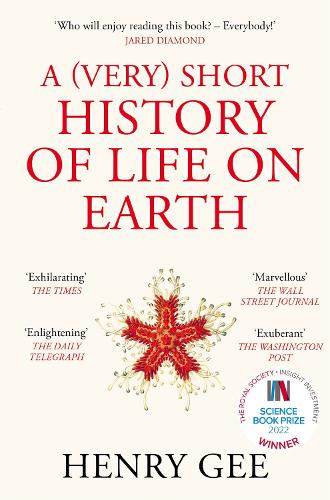
A (Very) Short History of Life On Earth: 4.6 Billion Years in 12 Chapters
(Paperback)
Publishing Details
A (Very) Short History of Life On Earth: 4.6 Billion Years in 12 Chapters
By (Author) Henry Gee
Pan Macmillan
Picador
13th December 2022
15th September 2022
United Kingdom
Classifications
General
Non Fiction
Popular science
Evolution / Evolutionary biology
Dinosaurs and the prehistoric world: general interest
The Earth: natural history: general interest
576.83
Physical Properties
Paperback
336
Width 130mm, Height 197mm, Spine 20mm
235g
Description
'Exhilaratingly whizzes through billions of years . . . Gee is a marvellously engaging writer, juggling humour, precision, polemic and poetry to enrich his impossibly telescoped account . . . [making] clear sense out of very complex narratives' - The Times 'Henry Gee makes the kaleidoscopically changing canvas of life understandable and exciting. Who will enjoy reading this book - Everybody!' Jared Diamond, author of Guns, Germs, and Steel For billions of years, Earth was an inhospitably alien place - covered with churning seas, slowly crafting its landscape by way of incessant volcanic eruptions, the atmosphere in a constant state of chemical flux. And yet, despite facing literally every conceivable setback that living organisms could encounter, life has been extinguished and picked itself up to evolve again. Life has learned and adapted and continued through the billions of years that followed. It has weathered fire and ice. Slimes begat sponges, who through billions of years of complex evolution and adaptation grew a backbone, braved the unknown of pitiless shores, and sought an existence beyond the sea. From that first foray to the spread of early hominids who later became Homo sapiens, life has persisted, undaunted. A (Very) Short History of Life is an enlightening story of survival, of persistence, illuminating the delicate balance within which life has always existed, and continues to exist today. It is our planet like you've never seen it before. Life teems through Henry Gee's lyrical prose - colossal supercontinents drift, collide, and coalesce, fashioning the face of the planet as we know it today. Creatures are engagingly personified, from 'gregarious' bacteria populating the seas to duelling dinosaurs in the Triassic period to magnificent mammals with the future in their (newly evolved) grasp. Those long extinct, almost alien early life forms are resurrected in evocative detail. Life's evolutionary steps - from the development of a digestive system to the awe of creatures taking to the skies in flight - are conveyed with an alluring, up-close intimacy.
Reviews
A scintillating, fast-paced waltz through four billion years of evolution, from one of our leading science writers . . . His poetic prose animates the history of life, from the first bacteria to trilobites to dinosaurs to us. -- Steve Brusatte, University of Edinburgh paleontologist and Sunday Times bestselling author of The Rise and Fall of the Dinosaurs
Exhilaratingly whizzes through billions of years . . . Gee is a marvellously engaging writer, juggling humour, precision, polemic and poetry to enrich his impossibly telescoped account . . . [making] clear sense out of very complex narratives * The Times *
This is now the best book available about the huge changes in our planet and its living creatures, over the billions of years of the Earths existence . . . Henry Gee makes this kaleidoscopically changing canvas of life understandable and exciting. Who will enjoy reading this book Everybody! -- Jared Diamond, author of Guns, Germs, and Steel
Henry Gees whistle-stop account of the story of life (and death lots of death) on Earth is both fun and informative. Even better, it goes beyond the natural human inclination to see ourselves as special and puts us in our proper place in the cosmic scheme of things -- John Gribbin
Dont miss this delightful, concise, sweeping masterpiece! Gee brilliantly condenses the entire, improbable, astonishing history of life on earth all 5 billion years - into a charming, zippy and scientifically accurate yarn. -- Daniel E. Lieberman, Professor of Biological Sciences, Harvard University
'Gee's prose is so infectiously enthusiastic, and his tone so accessible, that you'll find yourself racing through as if you were reading a novel - and you'll never find yourself scrambling for a good fact to wheel out at an awkward pause in conversation again.' * Reader's Digest *
Author Bio
Dr Henry Gee was born in 1962. He was educated at the universities of Leeds and Cambridge. For more than three decades he has been a writer and editor at the international science journal Nature. His previous books include The Accidental Species: Misunderstandings of Human Evolution; Across The Bridge: Understanding the Origin of the Vertebrates; Deep Time: Cladistics, the Revolution in Evolution; Jacob's Ladder: The History of the Human Genome; The Science of Middle-Earth, and (with Luis V. Rey) A Field Guide to Dinosaurs. He lives in Cromer, Norfolk, with his family and numerous pets.
